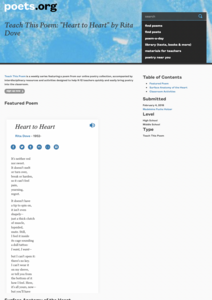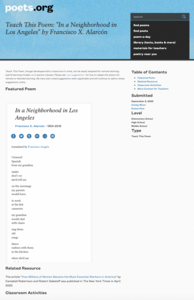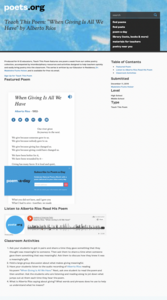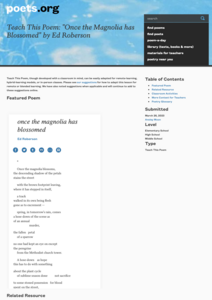Curated OER
"Your Son, Your Only One" - The Sacrifice of Isaac as a Motif in Holocaust Poetry
Class groups examine a series of poems that use Abraham’s willingness to sacrifice Isaac as a motif in Holocaust poetry. Included are questions, notes to the teacher, and bibliographical information on each poem. The activities could be...
Academy of American Poets
Teach This Poem: "The Metier of Blossoming" by Denise Levertov
Poetry analysis need not be a lugubrious exercise for young learners. The approach used with Denise Levertov's poem, "The Metier of Blossoming" is one of close observation, of noticing and reflecting on the words, phrases, and images the...
Curated OER
Poems: "The Rabbit"
In pairs or on their own, fourth graders read the poem, "The Rabbit." They then answer eight critical-analysis questions, requiring them to make inferences, and interpret the poem's meaning and use of language. The reading passage,...
Curated OER
African Phoenix: Poetry Worksheet
"African Phoenix" is a poem with strong imagery and voice. The class will read two poems then draw an image of what they feel the poems mean. This is a good way to spark critical analysis.
ReadWriteThink
What is Poetry? Contrasting Poetry and Prose
Introduce middle schoolers to the different strategies used when reading prose versus poetry. Groups use a Venn diagram and a poetry analysis handout to compare the characteristics of an informational text and a poem on the same subject...
Little Stones
How Can Poetry Make People Think and Care?
Can beautiful words change the world? Literary scholars discover how to paint their visions of change using poetry in a series of three workshops. Each independent topic gives participants a chance to examine their feelings about...
EBSCO Industries
Music and Poetry
Song lyrics, like poems, are meant to be heard. After examining the literary devices in several poems, scholars examine the lyrics of popular songs and identify the sound devices and the figurative language writers use to create the...
Wadsworth Atheneum Museum of Art
Where I'm From: Symbolism in Paint and Poetry
After a review of symbolism, class members use the provided worksheet to first list the objects they observe in Arnold Mesches' painting "Coney Island" and then suggest possible symbolic meanings for each of the objects. A second...
Academy of American Poets
Teach This Poem: “In This Place (An American Lyric)” by Amanda Gorman
Amanda Gorman, the United States's first National Youth Poet Laureate, is featured in a resource from the Academy of American Poets. Class members first read Dr. Martin Luther King, Jr.'s "I Have A Dream" speech and note what King wanted...
Academy of American Poets
Teach This Poem: “As I Walk These Broad Majestic Days” by Walt Whitman
Walt Whitman's poem "As I Walk These Broad Majestic Days" offers scholars an opportunity to practice their noticing skills. They first examine a postcard of the Newport News Shipyard listing things they notice about the image and how...
Academy of American Poets
Teach This Poem: "Violin" by Nikki Wallschlaeger
Nikki Wallschlaeger's Violin is the featured poem in a instructional activity that uses music and multiple readings to delve deep into its analysis. After a writing warm-up, learners watch and listen to a video that showcases Regina...
Academy of American Poets
Teach This Poem: "Heart to Heart" by Rita Dove
Take heart! Here's a lesson that will encourage learners to notice details. After listening to Sarah Vaughan singing "My Funny Valentine" and noting how the word heart relates to Valentine's Day, scholars observe a human heart image....
Academy of American Poets
Teach This Poem: “Making History” by Marilyn Nelson
What makes an event newsworthy, worth a reference in a news magazine or textbook? Who decides? These are questions Marilyn Nelson asks readers of her poem "Making History" to consider. To begin, class members list details they notice in...
Academy of American Poets
Teach This Poem: "In a Neighborhood in Los Angeles" by Francisco X. Alarcón
After sketching an essential person and reading an article, scholars read the poem "In a Neighborhood in Los Angeles" by Francisco X. Alarcón. They listen to the poem in English and Spanish and record lines that stand out to them. Small...
Academy of American Poets
Teach This Poem: "When Giving Is All We Have" by Alberto Ríos
What makes giving meaningful? Class members discuss this question, then listen to Alberto Rios reading his poem, "When Giving Is All We Have." Finally, the class considers what the poet says about the question.
Academy of American Poets
Teach This Poem: "The Snowfall Is So Silent" by Miguel de Unamuno
Cold, beautiful, unique! Class members closely examine John Singer Sargent's watercolor "Snow," taking note of the artist's techniques, and pair up to discuss how the image makes them feel about snow. They then repeat the process with...
Academy of American Poets
Teach This Poem: "somewhere i have never travelled,gladly beyond" by E. E. Cummings
Scholars engage in a role-play exercise, compare their demonstration to a time-lapse video, and to a poem by E.E. Cummings. The ensuing discussion asks learners to consider the similarities among the three.
National Endowment for the Humanities
Hopi Poetry
The Hopi refer to corn as their children, demonstrating its importance to the Native American group. Class members consider the role of literal and figurative language by examining poetry from this indigenous group. The resource includes...
Academy of American Poets
Teach This Poem: "The Shapes of Leaves" by Arthur Sze
Arthur Sze's poem, "The Shapes of Leaves," encourages young scholars to notice and speak for others who "do not speak." The lesson begins with pupils writing about a tree that they really like. The class then examines an image of...
Academy of American Poets
Teach This Poem: "Once the Magnolia has Blossomed" by Ed Roberson
A free write, an image of magnolia leaves, and the Ed Roberson's poem "Once the Magnolia has Blossomed" ask scholars to use their noticing skills to reflect on the lesson beauty teaches about loss and grief.
Poetry Society
War Horse and WWI Poetry
Here's a resource that deserves a place in your curriculum library. As part of their study of War Horse individuals create an anthology of World War I poetry.
Curated OER
Poetry: Walking With My Iguana
Bring a little excitement to your next poetry analysis lesson. Using the highly energetic poem "Walking With My Iguana," learners consider poem structure and rhyme. They listen to the poem, discuss the rhythm and tone with their...
K20 LEARN
Comparing/Contrasting Characters Through Two-Voice Poems: Characterization
Two babies, two fathers, two experiences, two worlds. Partners craft two-voice poems to capture the points of view of two men with very different lives who have just become fathers.
Roy Rosenzweig Center for History and New Media
War and Poetry
A band of brothers or the Devil's agents? Nobel warriors freeing the oppressed or mercenaries working for the military/industrial complex? Groups examine poems from the Civil War, World War I, and World War II to determine the poets'...
Other popular searches
- Elements of Poetry Analysis
- Poetry Analysis Worksheets
- Literary Analysis for Poetry
- Pablo Neruda Poetry Analysis
- Poetry Analysis Rubric
- Tpcastt Poetry Analysis
- Poetry Analysis Document
- Spanish Poetry Analysis
- Reading and Analyzing Poetry
- Poe Poetry Analysis
- Typecast Poetry Analysis
- Analyzing Poetry Structure

























